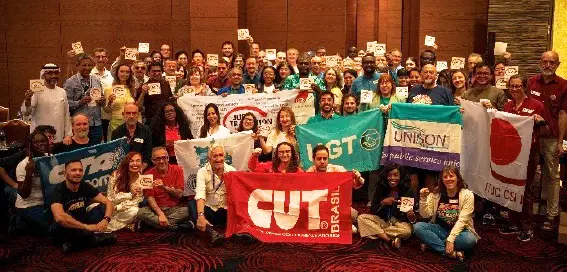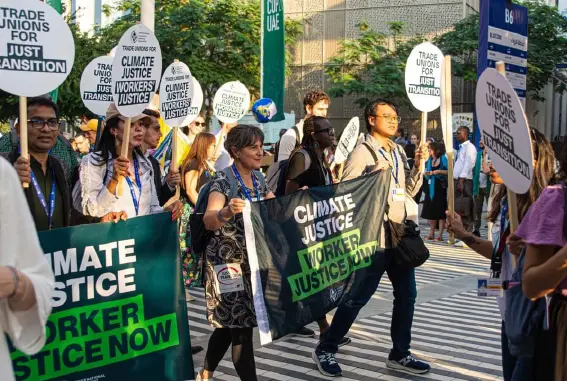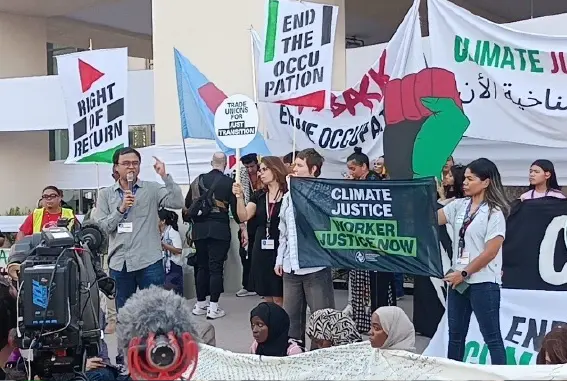GJA hosts open meeting and discussion of events at COP28

On 9th January, GJA was extremely happy to host a special open meeting to discuss the previous month’s COP28 in Dubai.
Jenny Cooper, who, along with Tony Wright, UNISON, had been the two U.K. trade union attendees, gave a superb and informative report back. It was Jenny’s second time at COP following Sharm-El-Sheikh last year.
The following summarises some of the points raised, but for full details of the events touched on here, please see the slide pack presentation here.
First, it will come as a surprise to no one that the U.K. government representatives have little time for the views of trade unionists, so any effort to influence policy or decisions would be filtered through a number of layers (unlike for Canada, whose trade unionists were in direct contact with their country’s negotiators.). Instead, activity was primarily focused on building contacts and relationships with fellow trade unionists from across the globe, and other activists and campaigners, and participating in alternative, more protest-oriented, events.

In terms of influencing the negotiations, the objective was to have the language of Just Transition written into the key texts, as this would be more likely to get workers involved in transition to a green economy. Four key pillars underpinned the trade union efforts:
- Social protection (E.g. the welfare state),
- Social dialogue (having conversations with those in power,
- Workers rights/labour rights (ensuring it’s not about losing jobs),
- Sticking to the 1.5° aim and phasing out fossil fuels.
 Outside the main conference a number of important activities were being pursued:
Outside the main conference a number of important activities were being pursued:
Education – greening the sector and schools, teaching the future workforce. Workshops had grassroots participation, all across the globe had similar stories to tell.
Lobbying – Jenny and Tony were able to meet with the Labour MPs who form the Climate Education Forum.
Contacts – building relations with Let’s Go Zero, hearing from Colombian coal miners where Just Transition is being done properly (or as close to it as can be hoped for), and representatives of the Fossil Fuel Non-Proliferation Treaty.
 Protest – huge marches through the streets involving campaign groups, unions, NGOs, youth groups. Just the act of being seen marching past the conference hall could have an impact on the negotiators, convey the depth of feeling among ordinary people. The previous year’s protest had focused – successfully – on loss and damage; this year, it was Palestine, and the message that there is no climate justice without social justice. Palestinian flags were banned, but creative ways were found of displaying the colours, and there were Palestinian speakers.
Protest – huge marches through the streets involving campaign groups, unions, NGOs, youth groups. Just the act of being seen marching past the conference hall could have an impact on the negotiators, convey the depth of feeling among ordinary people. The previous year’s protest had focused – successfully – on loss and damage; this year, it was Palestine, and the message that there is no climate justice without social justice. Palestinian flags were banned, but creative ways were found of displaying the colours, and there were Palestinian speakers.
Climate heritage
Farah Ahmed, who works for Julie’s Bicycle and was an attendee at COP28, gave a well-received report back on the building of global links in the cultural heritage and artistic domains. Sometimes overlooked in light of the big political debates, the sharing of artistic and cultural endeavours is an incredibly effective way of building relations with peoples across the continents. A ‘Group of Friends’ was established to develop these relationships long term, build the links between culture and climate issues within the UNFCCC’s processes, and importantly to remind us of the importance of the arts as a source of global unity.
More information can be found here https://www.climateheritage.org/jwd
Students Organising for Sustainability
We were also joined at the meeting by Zamzam Ibrahim from SOS-UK, who provided this link to Reflections on COP28 produced by the SOS delegation.
Zamzam also provided the following update about her activities, which will be of interest to GJA supporters:
“I’m currently working as a freelance consultant; running a training organisation for young people. I was at COP as a youth advisor on the Green Jobs for Youth Pact and was involved in some of the youth climate champion work around job creation.”
